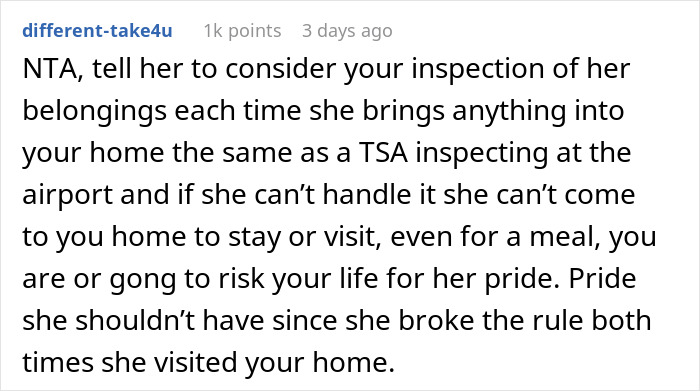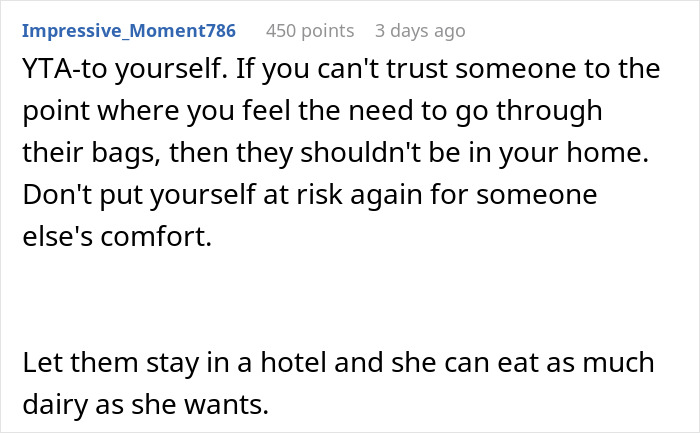While it can be hard to comprehend for someone who has never encountered it, allergies are not something to be taken lightly. While for some, certain products might just produce an errant sneeze, others can end up in the ER just from mild exposure. So ignoring someone’s allergies is very much a horrible thing to do.
A woman with a severe dairy allergy wondered if she was wrong to insist on checking her BIL’s and his GF’s bags after they repeatedly brought dairy into her house. She also shared some pretty sizable updates about the story. We reached out to the woman who shared the story via private message and will update the article when she gets back to us.
If someone puts you in the ER because they didn’t listen, you’d be wise to take precautions

Image credits: MART PRODUCTION/Pexels (not the actual photo)
So one woman started demanding to see what her BIL and his GF brought into her house





Image credits: Pavel Danilyuk/Pexels (not the actual photo)





Image credits: Alena Darmel/Pexels (not the actual photo)




Image credits: InvestigatorHour2911
Allergies can range from annoying and unpleasant to downright life threatening

Image credits: cottonbro studio/Pexels (not the actual photo)
While most empathetic and reasonable people understand that if someone says they have an allergy to something, it should be taken seriously, they tend to not actually understand how it works. After all, part of being supportive is actually taking the time to learn what affects other folk’s lives. It’s not just basic etiquette, it can be life saving.
So, a severe dairy allergy is an immune system overreaction to proteins found in cow’s milk (and often other animal milks as well). When someone with this allergy consumes milk proteins like casein or whey, their body treats them as harmful invaders and launches a defense by releasing antibodies and histamines. This can lead to symptoms ranging from hives and stomach upset to full‑blown anaphylaxis, a potentially life‑threatening reaction involving difficulty breathing, swelling of the throat, and a dangerous drop in blood pressure.
Symptoms of a milk allergy can appear within minutes to a few hours after exposure. Mild reactions might include itching around the mouth or skin rashes, while more severe cases can trigger vomiting, bloody stools (especially in infants), or respiratory distress such as wheezing and persistent coughing. In its worst form, anaphylaxis can cause dizziness, collapse, and even loss of consciousness, requiring immediate administration of epinephrine. As the woman in this story stated, she very literally had to visit the emergency room.
Despite these risks, some folks just don’t take them seriously

Image credits: cottonbro studio/Pexels (not the actual photo)
Despite the seriousness, many people lump dairy allergies together with lactose intolerance, a digestive issue caused by a lack of the enzyme lactase. Lactose intolerance leads to gas, bloating, and diarrhea but does not involve the immune system or pose a risk of anaphylaxis. Misunderstanding these as the same condition leads some to dismiss dairy allergies as mere stomach trouble rather than recognizing them as potentially fatal autoimmune responses. Similarly, some folks with very, very mild allergies can underestimate how an item can make someone feel.
This conflation fuels a dangerous attitude: “It’s just dairy, how bad can it be?” When society treats gluten‑free and dairy‑free diets as health fads, the real medical needs of allergy sufferers get trivialized. Casual remarks like “Just have a little milk; it won’t hurt you” ignore the fact that even trace amounts of milk protein can trigger a severe reaction. Underestimating the risk often results in delayed treatment and poorer outcomes for allergy sufferers. It doesn’t help that some folks labor under the assumption that you have to literally drink milk to have an allergic reaction.
Because accidental exposure can escalate rapidly, those with milk allergies must be vigilant. Carrying epinephrine auto‑injectors and reading labels religiously are essential safety measures. Friends, family, and foodservice workers also need better education to prevent cross‑contamination and ensure prompt response when a reaction occurs. Without widespread understanding and respect for the severity of dairy allergies, individuals remain vulnerable to life‑threatening emergencies that could have been avoided with proper awareness and preparedness.
This is probably why so many commenters were quick to call out the woman for even giving the couple a “second chance,” since they knowingly put her at risk beforehand. Searching their bags was, realistically, the only way to make it work given the fact that she literally put her host in the emergency room. If you wanted to know what happened next, you are in luck, as she shared a pretty sizable update later.
Readers thought the GF and her BF really overstepped themselves















She later shared the first of two updates





Image credits: Timur Weber/Pexels (not the actual photo)






Image credits: InvestigatorHour2911
In the final update, she shared all the ensuing relationship drama






Image credits: cottonbro studio/Pexels (not the actual photo)







Image credits: InvestigatorHour2911
People shared their thoughts in the comments












